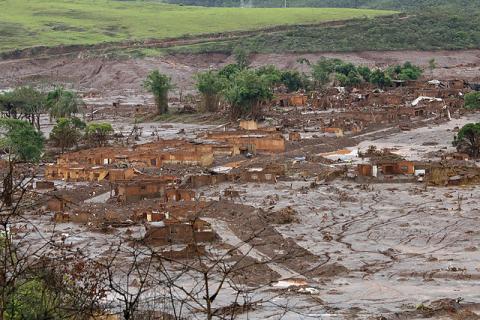
Sr. Teresa Dagdag, MM, considers what it takes to live in God's hope and undergo ecological conversion in these times of climate crisis.
While I was gathering my thoughts for this reflection, I received a message from a friend prompting me to pray that “God may spare our community and people from further devastation and death from nature’s wrath; we claim by faith that You alone can calm this storm.” The wrath of nature this friend was thinking of was Cyclone Tisoy or Kammuri (its international name), the 20th tropical cyclone that has occurred in 2019 and the fourth that has occurred in November in the Philippines, which we feared would lead to devastation for our communities. Her prayer called me trust that God alone can calm such a storm.
Prayer gives us hope when we find ourselves in fear; we need hope when tropical cyclones hit our immediate environment, when we anticipate landslides, flooding, loss of houses, crops, livelihoods, and deaths. I recall the worst tropical cyclone, Haiyan, in 2013, which killed at least 6,340 persons and destroyed houses and properties. It was a calamity of such severity that Pope Francis visited the Philippines to comfort its victims and survivors.
Terrible flooding hit in 2018, affecting India, Japan, North Korea, and Nigeria, and killing hundreds. Typhoon Hagibis, the most powerful typhoon that hit Japan in 2019, caused deaths, missing people, injuries, and loss of electricity for hundreds of thousands of people. Earthquakes in Papua New Guinea and Indonesia caused thousands of deaths due to the accompanying tsunami last year. Devastation also resulted from a volcanic eruption in Guatemala, a heat wave in Pakistan, forest fires in China, deforestation in Brazil, wildfires in California, and other environmental disasters in Indonesia, Siberia, and the Philippines.These effects have become all too familiar either through our own experience or through social media. No country has been spared from their effects.
External preparations for Christmas have started. In the Philippines, when September sets in, Christmas décor appears in homes and department stores; Christmas songs are aired on the radio and television. Godparents prepare gifts to represent the blessings that they bestow on their spiritual children.
We get busy with external preparations, but how do we prepare internally for Christmas, particularly when we have become beset by natural emergencies? Climate change has turned into a climate crisis and the crisis into climate emergency (Catholic Bishops Conferences of the Philippines Pastoral Letter, July 2019).
In the context of the climate emergency, many have been rendered blind, or deaf, hungry, speechless, disabled or dead by the flooding, wildfires or deforestation, and earthquakes; these people await the blessing of a God who reminds us to "be strong, do not fear! Here is your God” (Isaiah 35).
Among the signs of the times, I call to mind these recent messages: the United Nations as an international body announced that we have only a decade to go back to pre-industrial emissions levels to reverse the catastrophes that are caused by climate change. We also have the Church teachings in Laudato Si’ inviting us to ecological conversion, to change our ways towards nature, God’s creation. Indigenous peoples have been gifted with the wisdom to care for the Earth; we need to learn from them how to save ourselves from hurting millions.
Isaiah’s words promise that “the redeemed shall walk” in God’s highway and the ransomed of God shall return to Zion singing with joy. Pope Francis invites us to ecological conversion, to have compassionate care for the Earth, to heal the world so that the Earth community will be whole. Admitting that most of these calamities are caused by human activity, let us initiate action so that we can all be redeemed and enter God’s highway.
To do this, let us help the "blind" persons – including ourselves – to see that arrogance, apathy, and greed, the roots of environmental evil, have caused us to ignore the need to change from a consumerist to a zero-waste lifestyle. Let us address the deafness in others and in ourselves so that we can hear the cry of the Earth by avoiding the use of plastic that clogs and kills rivers, oceans and marine life and to hear the cry of the poor who often suffer from hunger as environmental refugees because of food insecurity. Let us provide for the hungry as we also learn to eat what is beneficial to the health of the soil, to eat less or avoid meat and instead consume more vegetables and fruits. Let us avoid mining coal and use renewable energy instead. Let us transform this kind of behavior in ourselves and in others and awaken from that indifference by working to promote a world where every single member of this One Earth Community is loved and cared for.
What other creative ways can we think of to care for our Common Home?
We only have Planet A; there is no Planet B. Isaiah’s highway is where God calls us to work for the wholeness of creation. If only we could take this season of Advent as the way to heed God’s call to care for our One Earth Community. There are prophets in our midst: the Magi, the sages, the wise women and men who invite us to care for our Common Home with the simplicity that started at the manger. Let us respond wisely and courageously, looking for the stars in our midst that lead us to the birthplace where we will join Emmanuel to work for Earth’s healing and wholeness.
